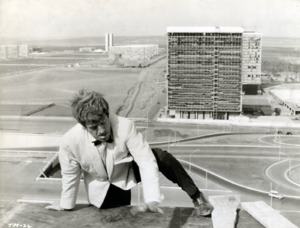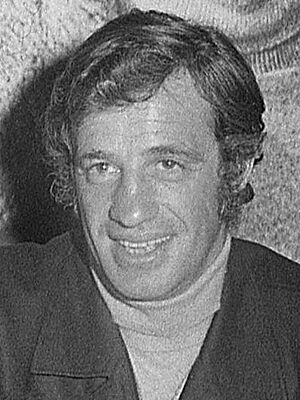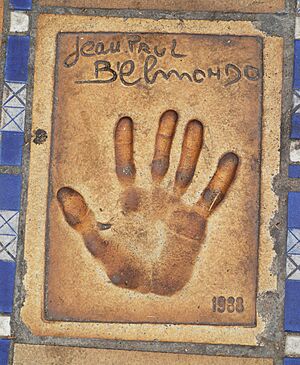Jean-Paul Belmondo facts for kids
Quick facts for kids
Jean-Paul Belmondo
|
|
|---|---|
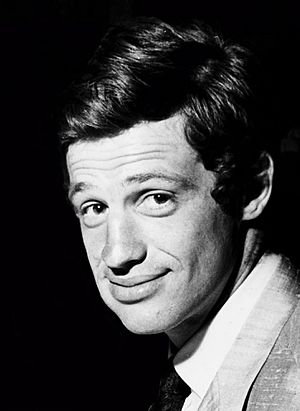
Belmondo in 1960
|
|
| Born |
Jean-Paul Charles Belmondo
9 April 1933 Neuilly-sur-Seine, France
|
| Died | 6 September 2021 (aged 88) Paris, France
|
| Resting place | Montparnasse Cemetery |
| Other names | Bébel |
| Education | Conservatoire of Dramatic Arts |
| Occupation | Actor |
| Years active | 1953–2011 |
| Spouse(s) |
Élodie Constantin
(m. 1952; div. 1968)Natty Tardivel
(m. 2002; div. 2008) |
| Partner(s) | Ursula Andress (1965–1972) Laura Antonelli (1972–1980) |
| Children | 4, including Paul |
| Parents |
|
| Awards | César Award for Best Actor 1989 Itinéraire d'un enfant gâté |
| Signature | |
 |
|
Jean-Paul Charles Belmondo (born 9 April 1933 – died 6 September 2021) was a famous French actor. He was a huge movie star in France for many years, starting in the 1960s. He was known for his roles in the "French New Wave" films.
Some of his most famous movies include Breathless (1960), That Man from Rio (1964), Pierrot le Fou (1965), and The Professional (1981). He often played brave police officers or adventurous heroes in action movies. Even though Hollywood wanted him, he preferred to make films in French.
Belmondo was incredibly popular in France, attracting almost 160 million viewers during his 50-year career. He was seen as a French version of actors like James Dean and Humphrey Bogart. People called him an icon and a national treasure. He won a César Award for Best Actor in 1989 and received special lifetime awards at the Cannes Film Festival and the César Awards.
Contents
Early Life and Training
Jean-Paul Belmondo was born near Paris on 9 April 1933. His father, Paul Belmondo, was a sculptor, and his mother was a painter. As a boy, Jean-Paul loved sports more than school. He was especially good at boxing and soccer.
He even had a short, undefeated boxing career, winning three fights by knockout. But he stopped when he noticed his face changing from the sport.
Belmondo became interested in acting. He went to a private drama school and later studied at the Conservatoire of Dramatic Arts in Paris for three years. He was very talented, but he once made fun of the school in a sketch, which upset the judges. This incident even made the news!
His Amazing Career
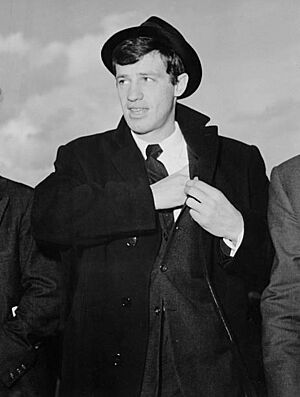
Belmondo started acting in plays in 1953. His first movie role was in a short film called Moliere (1956). He then got a small part in Be Beautiful But Shut Up (1958) with Alain Delon.
Becoming a Star in the 1960s
Belmondo's big break came with Jean-Luc Godard's movie Breathless (1960). This film made him a huge international star and a face of the "French New Wave" movement. Even he wasn't sure what the "New Wave" meant!
After Breathless, he made many different kinds of films. He supported Sophia Loren in the Italian film Two Women (1961) and worked with Godard again in A Woman Is a Woman (1961).
He had a massive hit with the adventure film Cartouche (1962). Another popular movie was A Monkey in Winter (1962), where he starred with Jean Gabin.
In 1964, he starred in the action-adventure movie That Man from Rio, which was a huge success in France and around the world. Belmondo loved making adventure films. He was offered roles in Hollywood but turned them down, preferring to work in France.
He reunited with Godard for Pierrot le Fou (1965) and made a comedy called Tender Scoundrel (1966). He also had small roles in big English-speaking films like Is Paris Burning? (1966) and Casino Royale (1967).
After a short break, Belmondo returned with the crime movie Ho! (1968) and the very successful comedy The Brain (1969). He also starred with Catherine Deneuve in Mississippi Mermaid (1969).
Action Hero in the 1970s
In 1970, Belmondo starred with Alain Delon in the hit gangster film Borsalino. He then started his own film production company, Cerito Films.
He made many successful action films, often playing tough characters. These included The Burglars (1971), The Inheritor (1973), and Le Magnifique (1974).
In 1975, he played a policeman for the first time in Fear Over the City, which was one of his biggest hits of the decade. He continued to play police officers and stuntmen in popular movies like Animal (1977) with Raquel Welch and Cop or Hood (1979).
Later Career and Awards
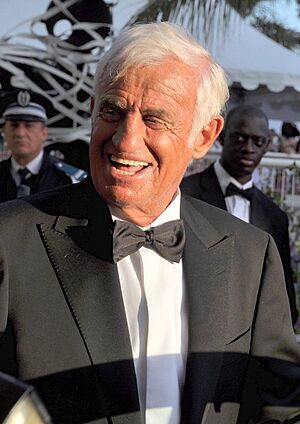
In the 1980s, Belmondo continued making popular action and comedy films. He starred as a secret service agent in The Professional (1981) and a pilot in Ace of Aces (1982). He often played policemen or adventurers in movies like Le Marginal (1983) and Hold-Up (1985).
In 1987, after 26 years, he returned to the theater, performing in a play called Kean. He said he always wanted to go back to the stage.
In 1988, he starred in Itinerary of a Spoiled Child, for which he won the César Award for Best Actor. He also played the main role in the play Cyrano de Bergerac in 1990, which was very successful.
He continued to act in films like Les Misérables (1995) and Une chance sur deux (1998) with Alain Delon. His final film role was in A Man and His Dog (2009), where he played a character with similar health issues to his own. He retired from acting in 2011 after suffering a stroke in 2001.
Honors and Personal Life
Jean-Paul Belmondo received many honors throughout his life. He was made a Knight, Officer, and Commander of the French National Order of Merit and the Legion of Honor.
He received honorary awards at the 2011 Cannes Film Festival (Palme d'Or) and the 2016 Venice Film Festival (Golden Lion). In 2017, he received a lifetime achievement award at the 42nd César Awards, which was met with a long standing ovation.
Belmondo married Élodie Constantin in 1952, and they had three children: Patricia, Florence, and Paul. They later divorced. He also had relationships with famous actresses like Ursula Andress and Laura Antonelli. In 2002, he married Natty Tardivel, and they had a daughter named Stella. They divorced in 2008.
Jean-Paul Belmondo passed away on 6 September 2021, at the age of 88. He had been in poor health since his stroke. A national tribute was held for him in Paris, where the French President called him a "national hero." His funeral took place the next day.
Legacy
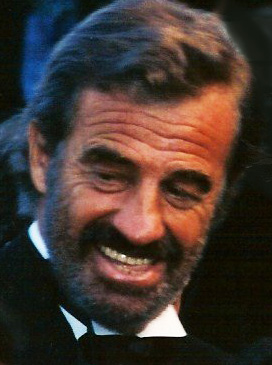
Belmondo is remembered as a very important part of French cinema history. He was seen as the face of the French New Wave and influenced many actors and filmmakers. His roles, especially as a police officer or adventurer, were considered legendary.
Many people believe that if he had accepted offers from Hollywood, he would have been just as successful there. Directors like Quentin Tarantino and Edgar Wright have said he was a big influence on them. Belmondo was truly an icon of French cinema, known for his energy, charm, and "super coolness."
Selected Films
| Year | Title | Role | Director |
|---|---|---|---|
| 1958 | Be Beautiful But Shut Up | Pierrot | Marc Allégret |
| 1959 | Web of Passion | Laszlo Kovacs | Claude Chabrol |
| 1960 | Breathless | Michel Poiccard | Jean-Luc Godard |
| 1960 | The Big Risk | Eric Stark | Claude Sautet |
| 1961 | Two Women | Michele de Libero | Vittorio De Sica |
| 1961 | Léon Morin, Priest | Léon Morin | Jean-Pierre Melville |
| 1962 | Swords of Blood | Louis Dominique Bourguignon | Philippe de Broca |
| 1962 | A Monkey in Winter | Gabriel Fouquet | Henri Verneuil |
| 1963 | The Finger Man | Silien | Jean-Pierre Melville |
| 1964 | That Man from Rio | Adrien Dufourquet | Philippe de Broca |
| 1965 | Pierrot le Fou | Pierrot (Ferdinand Griffon) | Jean-Luc Godard |
| 1967 | The Thief of Paris | Georges Randal | Louis Malle |
| 1969 | The Brain | Arthur Lespinasse | Gérard Oury |
| 1969 | Mississippi Mermaid | Louis Mahé | François Truffaut |
| 1970 | Borsalino | François Capella | Jacques Deray |
| 1971 | The Burglars | Azad | Henri Verneuil |
| 1975 | The Night Caller | Jean Letellier | Henri Verneuil |
| 1977 | Animal | Mike Gaucher / Bruno Ferrari | Claude Zidi |
| 1981 | The Professional | Josselin Beaumont | Georges Lautner |
| 1982 | Ace of Aces | Jo Cavalier | Gérard Oury |
| 1988 | Itinéraire d'un enfant gâté | Sam Lion | Claude Lelouch |
| 1995 | Les Misérables | Henri Fortin / Jean Valjean | Claude Lelouch |
| 2009 | A Man and His Dog | Charles | Francis Huster |
Images for kids
See also
 In Spanish: Jean-Paul Belmondo para niños
In Spanish: Jean-Paul Belmondo para niños
 | Misty Copeland |
 | Raven Wilkinson |
 | Debra Austin |
 | Aesha Ash |


